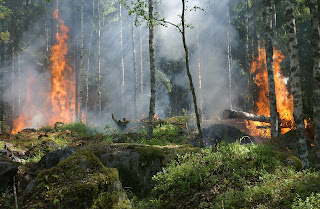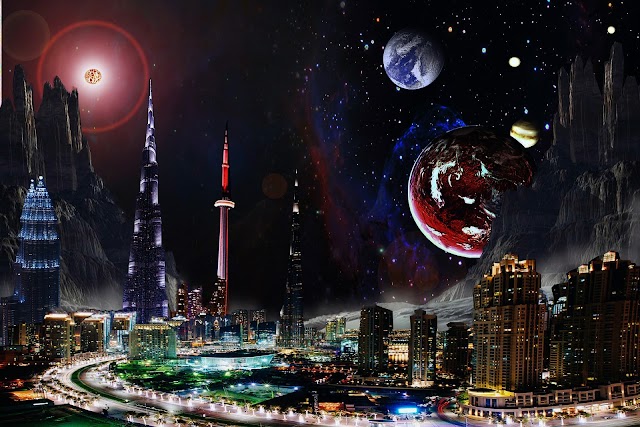Formation of our planet Earth took place around 4.5 billion years ago. Severe impact of numbers of interstellar objects like asteroids, meteors, dust particles shaped the planet as we see it in present time. Initially, it was just a hot blob molten metals and rocks. Eventually, billions of changes took place to make the planet fit for the survival of millions of species diversity as we see it today. The Earth's biodiversity, as we see in present time is nothing but the resultant outcome of all physiochemical changes happened in its past.
All the changes that occurred on the Earth not only affected the physique of the planet, but also had massive impact on many living species. Abiogenesis or origin of life took place on Earth around 3.7 billion years ago. Life of microscopic organisms flourished in ocean which mark the beginning of all living species as we see them today. As time passed, new organisms evolved. Numbers and types of living species increased. But with time Earth had to face drastic changes, which had a severe impact on the existed species. Since then, our Earth had faced major extinction events in past. Some are less intense, some are so severe that it wiped out nearly 95% of all biodiversity all at a time that ever lived on earth.
There are 5 major mass extinctions that had devastated the planet in a harsh way. Millions of species completely lost, some survived and evolved. Reports shows that about 5 billion living species evolved on our planet since beginning, out of which 99 per cent are already extinct.
Survival of species is the ability of the organisms to adapt to the changes that occur in their environment. They compete for food, water and shelter. According to Charles Darwin's theory of natural selection, 'survival of the fittest' plays an important role in the species diversity that dominates the Earth. The species that struggled for its survival on the planet, eventually became extinct. However, gradual extinction is also a major step in evolution of life. And hence, billions of species are completely lost on the planet.
If we try to draw conclusions based on our pasts, then unfortunately the results are not so well. Its quite terrifying that if something like dinosaurs, the most dominating species before humans could vanish from the planet, then we humans are nothing. We have no much time left in our hand to face such an event that will wipe out humanity. So, is there any possibility that another mass extinction is on its way? Will humanity going to vanish from Earth? It's a hot topic in the present time. Let's dive into the topic in details.
HOW HUMANS EVOLVED?
Millions of species inhabited our planet Earth before prehistoric humans. Some are way more powerful and dominating than us. But in evolutionary struggle, humans are the only one to obtain the advantage of their existence. Humans (Homo sapiens) are the present day dominating species on the planet that changed the environment around the world. But it took several million years to adapt those changes that we see in modern man.
Origin of our ancestors took place around 20 million years ago. They are the fruit eating creatures on African trees and known as 'Proconsuls'. They were feeding on fruits and leaves. They climbed with their four limbs. Both the upper and lower limbs are the same. Their skull was primitive and brain was small and simple. Study of their fossils revealed that their jaws are placed in such a way that they are less aggressive, which marks an important feature of humans.
Around 10 million years ago, their is a severe drop in temperature in African region. As a reason, the species were unable to approach the branches of trees. A new species evolved, called as 'Ardipithecus'. They moved on their rear limbs. Their feet were broad, which allowed bipedalism. But able to walk not easily as we humans do. But the species was an intermediate between humans and apes. They were both entirely human-like and entirely ape-like.
However, life moved on. Trees became sparse, Africa became a boundless savanna. So, it became impossible to climb the trees. Around 4 million years ago, a new creature in savanna appeared, called as Gracile australopithecus. They were well adjusted to their home. They walked on both legs not much different from ours. They gathered and ate everything and walked for miles. They became the first species that formed cohesive groups that allowed them to repel danger.
About 3 million years ago, Australopithecus afarensis of east Africa evolved into first humans. The species that marks the first representative of our genus is known as Homo habilis, which is regarded as the handy man. This is because they were the first to make and use stone tools. They used it for several purposes like carving meat, killing prey, defending from predators, etc.
Humans are now armed. Life on tree was left behind. The intelligence of human brain helped itself to protect and survive on the planet. The face size became smaller. Around 1.5 million years ago, a new species Homo ergaster evolved. This is considered as the working man. This is where human brain is much developed. Human became hunter. They used spear, stone tools and dominated forests by killing large animals like elephant, antelopes, etc. More characters were similar to that of modern man.
Evolution played a very important role in development of human brain. The species named Homo erectus lived between 1.9 million and 200,000 years ago. They are though to have been the first species to build shared fireplaces for cooking food. Within the last million years there had been dramatic advances in human evolution. Just before the modern man, a species evolved known as Homo neanderthal. It evolved around 200,00 years ago in Southern Europe. They have bulkier bodies that resisted cold of the ice. Their brains were large and there are evidences they buried their dead.
Around 200,000 years ago, our own species Homo sapiens appeared. The first species appeared in Africa and began to spread about 100,000 years later. All other human-like species became extinct, while modern human flourished and civilization began. With larger brain, humans are now able to use spoken language. They are very adaptable and learned to make more advanced tools. Since then, humans have made rapid advancement in almost every possible fields in the world. Technology, science, experimental, literature, philosophy, infinite and endless possibilities humans have explored and continuing. With these fast developments, drastic changes took place on the planet.
THE GREAT ACCELERATION AND IT'S IMPACT
Rapid developments on the planet had been seen over past few centuries. Great acceleration refers to the drastic changes that took place around the globe at much faster rate. Above all, human population had a massive impact on the planet. The population itself surged from 1.1 billion in 1880 to 8.0 billion in 2023. With rapid advancements, the global economy had already crossed 100 trillion in the year 2022. From which, only U.S and China comprises about 40.76% from the total economy. With these massive progress around the Earth, the planet had to face numerous changes that unfortunately had created negative impact on our planet in a harsh way.
The great acceleration is causing massive anthropogenic damage to our planet. There had been an exponential increase in the pollutants over the Earth. The industrial revolution had made drastic changes to the Earth's biodiversity. Release of excess of carbon dioxide to the atmosphere destabilized the global balance of Earth's ecosystem. The green house gases increases the planet's temperature by 1°c each year. A single degree change can affect whole biodiversity of the Earth.
Ocean plays a key role in balancing the planet's ecosystem. But, due to the changes, their had been a severe impact on Earth's ocean. Ocean absorbs about 90% of heat produced by man-made carbon dioxide. Due to the rise in the amount of carbon dioxide in the air, rise in ocean temperature had damaged rich aquatic ecosystem. Amount of carbon dioxide emission is estimated to be roughly 34 billion tones per year from burning of fossil fuels. From which, 45 per cent is only liberated from burning of coal. This has a severe impact on Earth's climate.
Forests are considered as the most precious and gifted thing on planet Earth. They meet the needs of the entire living world in almost every aspects. Due to rise in temperature, the forest fires are spreading at much higher rate. The large forests with rich diversity of ecosystem are collapsing day by day.
With the unchecked anthropogenic activities, the planet had became unstable in all fields. The effect is seen worldwide in present time. Frequent storms and major natural calamities occurring in day to day life in every corner of the Earth. Due to drastic changes in climate, from oceanic currents to the atmosphere, everything had lost control. It's due to the excess consumption of natural resources by humans and not conserving it. There will be a severe impact on our future generations, if nothing gets changed.
THE END OF HUMANITY
So, is humanity going to be extinct? Humans, as the present day dominating species has created massive impact on the planet Earth. According to the National Academy of Sciences, the 6th mass extinction had already began at the middle of 20th century. Reports say, this extinction had already affected 75% of terrestrial habitats and 66% of all marine ecosystem. We have interrupted climate pattern, oceanic activities in a negative way.
Due to the severe impact on Earth's ecosystem, the food chain is also disrupted. We are losing species at much faster rate. Humans, as only discovered species in the observable universe inhabited the Earth, but now had failed to protect it. Is this the end? It's literally became too late to change the planet as it was before. Unfortunately, everything's becoming out of control. Now, it's really terrifying that humanity will extinct one day.
SOURCES


















0 Comments
If you have any doubts, please let me know.